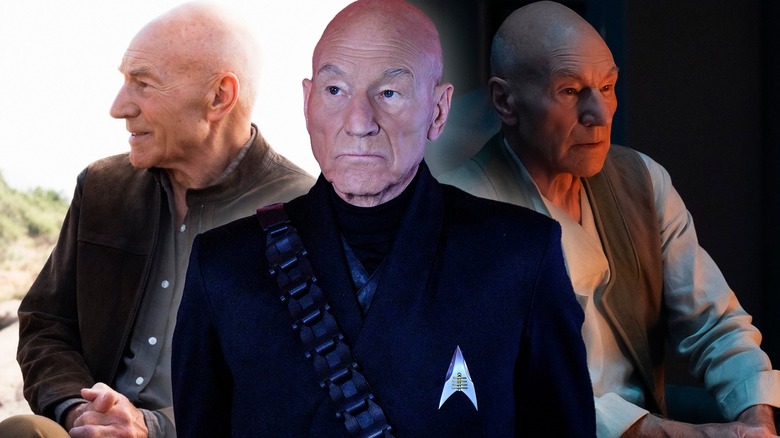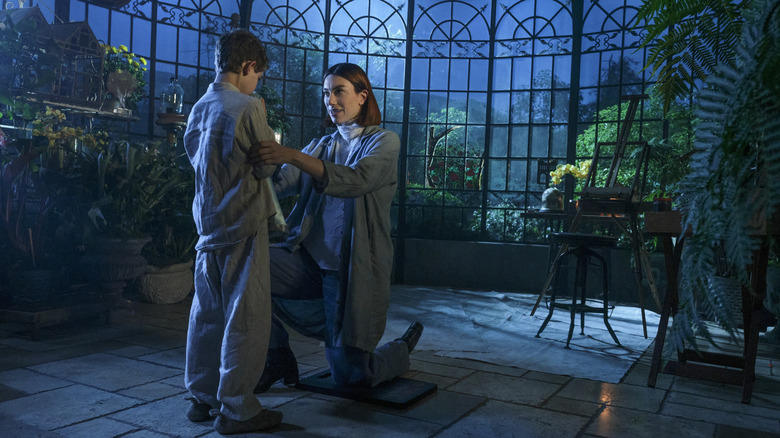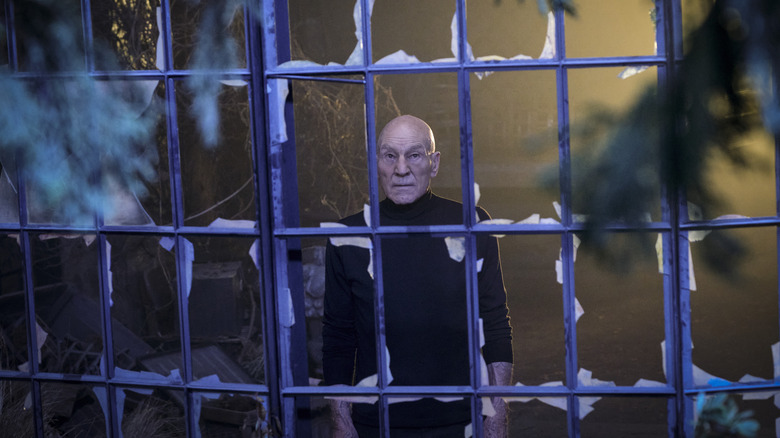Star Trek: Picard Has Forever Blurred The Lines Between Jean-Luc Picard And Patrick Stewart
This article contains spoilers for "Star Trek: Picard." It also contains references to domestic and child abuse, so reader discretion is advised.
Art often imitates life, but in the case of "Star Trek: Picard," that seems completely intentional. The series has completely blurred the lines between Jean-Luc Picard, the Starfleet officer who likes his Earl Grey hot, and Patrick Stewart, the British actor who has become a worldwide treasure. The series deals heavily with the idea of legacy, and the third season has dug into the concept even further as Picard reconciles the fact that he has a long-lost son, Jack Crusher (Ed Speelers). Picard had a difficult childhood and contentious relationship with his own father (as detailed in season 2 of "Picard"), and it's clear that the idea of fatherhood makes him uneasy as a result. Stewart has been honest about his own struggles in childhood as well, revealing that his father suffered from Post-Traumatic Stress Disorder as a result of his experiences in the military during World War II.
This isn't the first time that "Picard" has drawn from Sir Patrick's life, of course, as his love of dogs and his work as a Pit Bull breed advocate found its way onto the series through the adorable canine costar "Number One" in the first season. But mining Stewart's family history for the story is a bit different. For many, Jean-Luc Picard and Patrick Stewart are forever entwined, and it feels like the series is trying to be a proper send-off for them both.
A painful past
The second season of "Picard" dove into the character's childhood more deeply than it ever had before, examining his relationship with his parents through flashbacks and a fantasy sequence in episode 7. We see young Jean-Luc running around Chateau Picard as a boy (played by David Birkin), and his mother Yvette (Madeline Wise) is a source of both comfort and concern. She's very sweet to Jean-Luc and helps inspire his interest in the stars, but she's also struggling with mental illness and is occasionally paranoid and delusional. Picard's father, Maurice (James Callis) chases them around in the memory, trying to lock Yvette away. It's only later that Picard realizes that his father was trying to protect the both of them, even if his methods felt cruel and frightening at the time.
Stewart had a difficult childhood, growing up in West Riding, England with a father who was always angry when he wasn't absent and a mother who struggled to raise the children almost on her own. His father, Alfred Stewart, was a military man who served in World War II and came back a changed man. While on the BBC series "Who Do You Think You Are?," Patrick discovered that his father had seen real horrors in France and had "shell shock":
"We experienced an angry man, where he hadn't been angry before, and this could explain why. [...] It was a nightmare, bloody chaos. It both fascinated and horrified me."
While he understood the reasons behind his father's abusive behavior, it didn't stop the trauma that resulted from that abuse, or the ways that trauma would shape the rest of Stewart's life.
The clarity of time
Stewart and his brothers grew up "hand to mouth" and sometimes had to hide behind the couch with their mother when the landlord came to collect rent, but they enjoyed time with their mother and things often declined when his father would come home. In an article he wrote for The Guardian, Stewart was candid about how his father's military experience had changed him for the worse:
"Our house was small, and when you grow up with domestic violence in a confined space you learn to gauge, very precisely, the temperature of situations. I knew exactly when the shouting was done and a hand was about to be raised – I also knew exactly when to insert a small body between the fist and her face, a skill no child should ever have to learn. [...] Such experiences are destructive. In my adult life I have struggled to overcome the bad lessons of my father's behaviour, this corrosive example of male irresponsibility. But the most oppressive aspect of these experiences was the loneliness. Very recently, during a falling-out with my girlfriend, I felt again as though I were shut out and alone, not heard or understood. I was neither, but it was such a familiar isolation that it was almost a comfort and consolation."
Jean-Luc Picard shares this deep loneliness with the man who plays him, and the reasons behind it have been revealed through the course of "Picard." Like Stewart, the Starfleet captain had a very painful childhood where he was forced to grow up too soon, and it left him with a deep longing for parental love and protection in adulthood that could never come.
Sins of the father
In the third season of "Picard," Jean-Luc discovers that he has an adult son with Beverly Crusher (Gates McFadden), and he doesn't quite know how to process that information. As much as he wishes that he could have been a part of Jack's life, he also fears passing down more generational trauma. He doesn't want to hurt Jack the way he was hurt by his mother and father, though his absence ends up being its own kind of hurt. In fact, Picard hurt his son the most without ever knowing, when the young man asked Picard about the need for family and Picard, unaware that he was speaking to his son, said that Starfleet was the only family he could ever need. Stewart found comfort in acting and Picard found comfort in Starfleet, because the bonds of biological family were a source of anguish. Unknowingly, he passed on more pain right to the one person he would have wanted to protect most.
"Star Trek: Picard" has been a bit uneven over its three seasons, but the third season and its handling of the legacies of both Jean-Luc Picard and Patrick Stewart are worth commending. It's not easy to dig up the past and lay yourself bare, even though the lens of science fiction. Thank you for sharing so much of yourself with us, Sir Patrick. If to be human is "to make yourself more than you are," then you are more human than human.
If you or someone you know is dealing with domestic abuse, you can call the National Domestic Violence Hotline at 1−800−799−7233. You can also find more information, resources, and support at their website.



